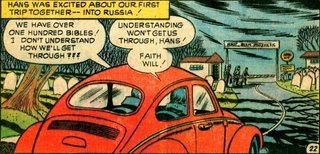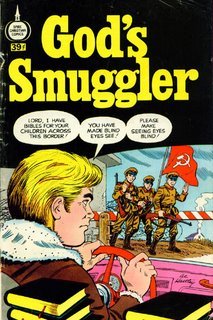My wife recieved an unexpected surprise last weekend. Cheap books. She likes to peruse the dime-priced, used books at the local library--a favorite pastime of those with Scots-Irish frugality rushing through their veins.
It turns out that one of the books was a biography of a bible smuggler during the Cold War of the 1950s. At first I did not recognize the book. So my wife bought it.
And she read it, explaining to me the interesting history of this man named "Brother Andrew". He was raised Dutch; survived WW II; and abandoned his upbringing.
Then the book got interesting: after a bitter experience in the Dutch army resulting in a foot-injury, he began to seek God. He was healed, decided to seek the ministry outside the Reformed tradition he was reared in and ignored the advise of a sweet Dutch girl concerned with his new mystical direction in life.
And then the novel went down hill from there--as far as my wife was concerned it went absolutely weird. Charismatic weird, that is.
For you see my wife was raised Reformed most of her childhood. I, on the other hand, was reared Charismatic--speaking-in-tongues, slain-in-the-Spirit, lay-the-'ol-fleece-before-God, die-in-the-wool, Charismatic.
Old memories rushed into my soul, recalling the confusion and struggles of my childhood religion. Accordingly, I suggested to my wife: "Dear, if you can read this book, then you will sufficiently be inculcated into that gestalt known as 'Charismatic'--you'll better understand them" (or some such gentle endorsement).
Cranky
Well, as the days progressed, my wife grew increasingly aggitated, exclaiming, "incredible"; "no way!"; "did that really happen?!". All the while, as she grew more incredulous with every reading of the progressively disturbing Charistmaic antics of yesteryear--random, and
 irrational acts: traveling without money; participating in foreign worship without knowing the language; laying the illegal bible right on the front seat at check-points; trying to sell a perfectly good house while having four children and no job--I gave her that knowing smile: "Been there; done that!"
irrational acts: traveling without money; participating in foreign worship without knowing the language; laying the illegal bible right on the front seat at check-points; trying to sell a perfectly good house while having four children and no job--I gave her that knowing smile: "Been there; done that!"She muttered and grew cranky with the book. Never having met, let alone heard, someone with such improbable events, she did not know how to digest the book. Calming down (and against sound advise), she, with morbid fascination slipped into the twilight zone: interacting with a bizarro world where every good, common, providential sense was defenestrated, she plowed through the rest of the novel. She discovered little of Christ and more sensationalism.
Heartless
Naturally, those inclined toward reading these books and thinking in those terms will find this posting rather rude, if not insulting. Surely I must be one of those hard-nose, cranky, heartless Calvinsits!
Indeed I am. A Calvinist that is. I do take exception to being verbally attacked so, but I'll get over it. I do love my brethren outside the Reformed faith. That is why I try to woo them to a better path.
Indeed I am. A Calvinist that is. I do take exception to being verbally attacked so, but I'll get over it. I do love my brethren outside the Reformed faith. That is why I try to woo them to a better path.
With the vast majority of Charismatics (sometimes called Pentecostals) denying God's providential control of all things, they naturally gravitate toward the miraculous. The mundane just won't do; God is not in the details of life. Besides, to think in a common-sense way was almost to succumb to the "flesh".
If God does not predestinate the means as well as the ends, then He must be found in other ways. He must "miraculously" intervene in our lives. Faith was against understanding. Using the ordinary means of life was, at
 times, almost anathama. At least in the books I read and the circles I travelled.
times, almost anathama. At least in the books I read and the circles I travelled.Having no supernatural, monergistic regeneration in my doctrine of salvation while a Charismatic, I, living in the shadow of classical Protestantism, desired the supernatural in my life. Separating God's work of grace into two-stages, I was not taught to integrate my life with the bland, the bromidic, and the banal.
Preaching was not enough; the ordinary means of grace--from the Sacraments and public worship to Bible studies and fellowship--were submerged in a confused world of hyper-supernaturalism, almost a Christanized Paganism wherein I strived to find God's will in my life and debated whether or not houses or Christians could be demon possessed or if the OT prohibition on owls had some continuing demonic referent (Lev. 11:13).
I was not taught to think. Charismatics virtually have no systematic theology book to claim. If God's revelation is still ongoing outside the finished Word, then anything written could change in a moment of spiritual frenzy.
I claim no heartlessness, but a love of Christ. It is true, that to have all the truth in the world but not to be animated by love is to have heartless doctrine. It is also true that to have all the love in the world but to be sustained in error is to have a lying heart.
We must remember that the saints of old followed the most ordinary precautions, trusting that they would be sufficient because God sustains all things by the power of His Word, while recognizing that God was not limited to such means. Joshua spied out the land (as "Brother Andrew" recognized); Nehemiah set up security while rebuilding the wall (Neh. 4:18); Christ preached when he could have used miracles. The entire Bible is rational discourse and understandable stories.
This is true faith: using that which God commands and promises. He commands common-sense use of our renewed mind (Rom. 12:2); He promises to sustain that very mind for His glory:
"Unless the LORD builds the house, They labor in vain who build it; Unless the LORD guards the city, The watchman stays awake in vain." (Ps. 127:1)
You see, my dear friend, you need shelter, but it won't be built out of thin air. You need God's will, but you must seek it only in His Bible.
SDG

1 comment:
Good post. I appreciate your thoughts. God told Noah He was going to save Noah and his family. Then He told Noah to build a boat. God almost always works through means, and more the fool are we if we ignore them.
Post a Comment